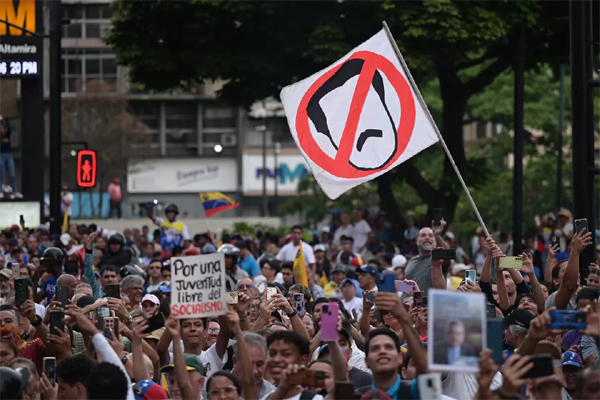
Latin America Daily Briefing
Venezuela’s presidential campaign season officially started yesterday — the vote will be July 28, amid significant uncertainty. President Nicolás Maduro faces his most serious challenge yet as opinion polls favor the opposition, but in a context of ongoing repression against critics, nobody expects a fair election. Experts say Maduro is unlikely to relinquish power if the international community does not facilitate an exit ramp.
Edmundo González Urrutia is the candidate for the Plataforma Unida Democrática, an opposition coalition that fielded him after the government banned opposition leader María Corina Machado from running. The two held a campaign rally in Caracas yesterday and the vehicle transporting them was temporarily stopped by police.
Maduro launched his own campaign yesterday saying he had conversations with Christian pastors who prophesied 2024 would be the start of seven years of prosperity and happiness.
Venezuela’s upcoming elections are unlikely to be free and fair because widespread repression in the country prevents dissident voices from being heard, warned UN Human Rights chief Volker Türk at the UN Human Rights Council yesterday.
“We are deeply alarmed by the arrest of opposition members, arbitrary disqualifications of opposition candidates, and efforts to further restrict civic space, as the authorities ramp up repression ahead of the elections in July,” said Human Rights Watch yesterday’s UN Human Rights meeting. At the same meeting Brazil called for the full implementation of the Barbados Agreement – a road map for free and fair elections signed in 2023 between the Maduro government and the opposition. And European countries denounced the disinvitation of EU election monitors by the Maduro government.
Nonetheless, opposition politician Leopoldo López said he was optimistic millions of Venezuelan voters would spark a democratic transition when they cast their ballots. “We ask the Human Rights Council, the U.N., and the countries present to pay maximum attention to what is happening in Venezuela,” López said. “There is a gigantic opportunity for Venezuela to transition to democracy.”
(Infobae, Associated Press, El País, EFE, Voice of America, International Service for Human Rights, Reuters)
More Venezuela
- Ámbito reports that Pope Francis named a Maduro ally, Raúl Biord Castillo, cardinal of Caracas, replacing an opponent of Venezuela’s government in the post.

Brazil
- Brazil’s Federal Police indicted former President Jair Bolsonaro for money laundering and criminal association in relation to jewelry gifted by Saudi Arabia to the leader while he was in office. This is Bolsonaro’s second indictment since leaving office, following another in May for allegedly falsifying his COVID-19 vaccination certificate, reports the Associated Press.
- The jewels in question include a diamond necklace and are valued at about $900,000, reports El País. Members of Bolsonaro’s committee sought to smuggle them into Brazil without declaring them and later sell some in the U.S.
- “Brazilian cyber gangs are increasingly stealing data and holding it for ransom, and getting ahead of law enforcement, which is struggling to keep up with an explosion of cyber crimes,” reports InSight Crime.
Regional
- Hurricane Beryl was heading towards Mexico’s Yucatán Peninsula this morning as a Category 2 strength storm, after week of destruction through the Caribbean killing at least eight people and flattening entire islands, reports the New York Times.
- Officials in the multi-island countries of Grenada and St Vincent and the Grenadines said the death toll could increase as they struggle to assess the damage on some islands, reports the Guardian.
- Seven islands in the eastern Caribbean, where Beryl first made landfall on Monday and leveled some small islands with “98% destruction,” are reeling, reports the Miami Herald. Cleanup began in Jamaica yesterday after Beryl receded, leaving roofless homes, flooded buildings, blocked roads and extensive power outages, as well as at least one confirmed death.
Bolivia
- Lingering questions over last week’s botched coup attempt in Bolivia have spotlighted the bitter political divide between President Luis Arce and his political mentor, former president Evo Morales, which threatens “to prolong the crises roiling the country ahead of elections next year,” reports the Financial Times.
Migration
- Changes in U.S. migration policy have spurred more migrants to pause their journeys in Brazil’s Amazon, pressuring local communities that are hard-pressed to meet their needs, reports the Associated Press.
Colombia
- Colombian President Gustavo Petro’s goal to advance agrarian reform remains stalled, despite a significant budget allocated to the project, reports El País.
Argentina
- Argentine President Javier Milei appointed Federico Sturzenegger — believed to be the author of the government’s much watered down effort to deregulate vast swathes of the economy by decree — as minister of deregulation and transformation of the state. (Reuters)
- The conservative PRO party’s assembly yesterday became a “shouting match” between supporters of Security Minister Patricia Bullrich and former president Mauricio Macri — the candidate favored by Macri was ultimately elected to lead the party, reports the Buenos Aires Herald.
El Salvador
- El Faro portrays some of the victims of El Salvadoran President Nayib Bukele’s state of exception: the people who have been arrested, but also the mothers of the disappeared, those displaced from their land by hypothetical mega development projects, water defenders arrested under the state of exception, and the relatives of the detained.
Nicaragua
- A Confidencial investigation details how Nicaragua’s ruling Ortega-Murillo family used a front company to takeover the country’s electricity sector. (Via Latin America Risk Report)
Letras
- Festival Gabo 2024 kicks off in Bogotá — El País
Jordana Timerman / Latin America Daily Briefing
latinamericadailybriefing.blogspot 07 05 2024







